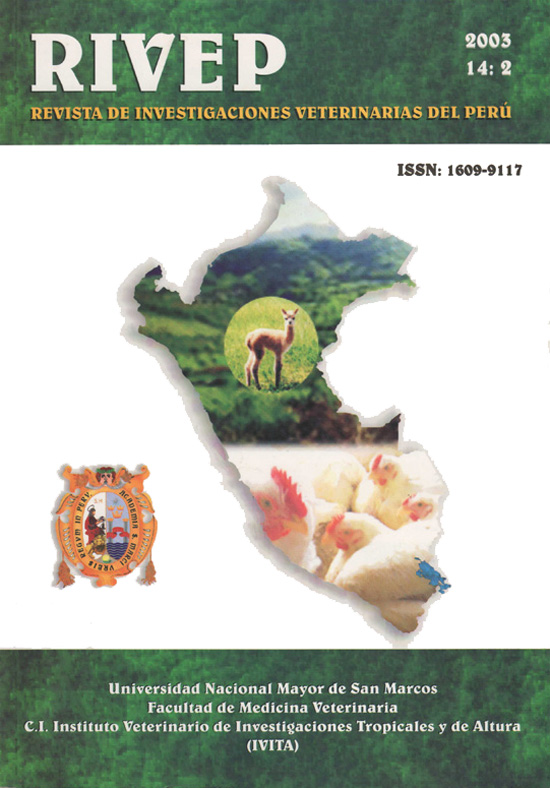USO DEL ENSILADO BIOLÓGICO DE PESCADO EN LA ALIMENTACIÓN DE CUYES MEJORADOS
DOI:
https://doi.org/10.15381/rivep.v14i2.1612Keywords:
Guinea pig, fish silage, body weight gain, consumption, carcass performance, economic benefits, organoleptic trialAbstract
The study evaluated the effect of the fish silage on feed rations for Guinea Pig (Cavia porcellus). Eighty guinea pigs of the Peruvian line (1/2 blood) , weaned at 14 ± 3 days of age, were used. The treatments consisted of different levels of fish silage: 0 (D0), 10 (D10), 20 (D20) and 30% (D30). The study lasted 10 weeks and was divided in three stages: 0-42, 42-70 and 0-70 days. Body weight gain and food intake was higher in D10, D20 and D30 as compared to DO (p<0.05), whereas no differences were found between D10, D20 and D30. In all stages, food conversion was higher in D20 and D30. The carcass performance was better in D30 and the economic benefit was better in D20. The organoleptic trial suggested that meat flavor and smell were affected on D20. It was concluded that the use of fish silage in the rations improved the productive performance of the guinea pig, where 20% content was the most appropiate based on organoleptic and economic terms.Downloads
Downloads
Published
Issue
Section
License
Copyright (c) 2003 Jessika Mattos C., Lilia Chauca F., Felipe San Martín H., Fernando Carcelén C, Teresa Arbaiza F.

This work is licensed under a Creative Commons Attribution-NonCommercial-ShareAlike 4.0 International License.
AUTHORS RETAIN THEIR RIGHTS:
a. Authors retain their trade mark rights and patent, and also on any process or procedure described in the article.
b. Authors retain their right to share, copy, distribute, perform and publicly communicate their article (eg, to place their article in an institutional repository or publish it in a book), with an acknowledgment of its initial publication in the Revista de Investigaciones Veterinarias del Perú (RIVEP).
c. Authors retain theirs right to make a subsequent publication of their work, to use the article or any part thereof (eg a compilation of his papers, lecture notes, thesis, or a book), always indicating the source of publication (the originator of the work, journal, volume, number and date).



